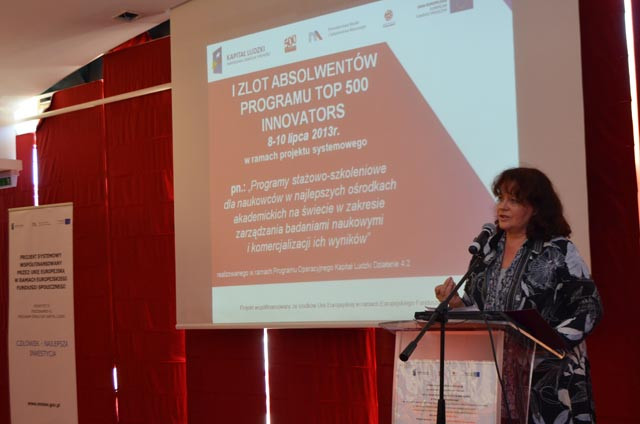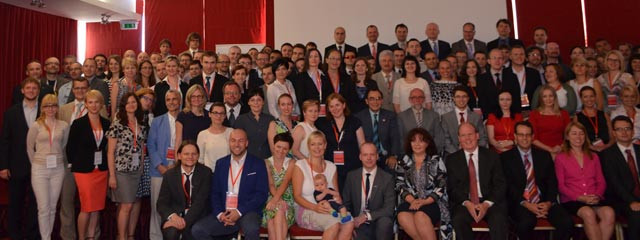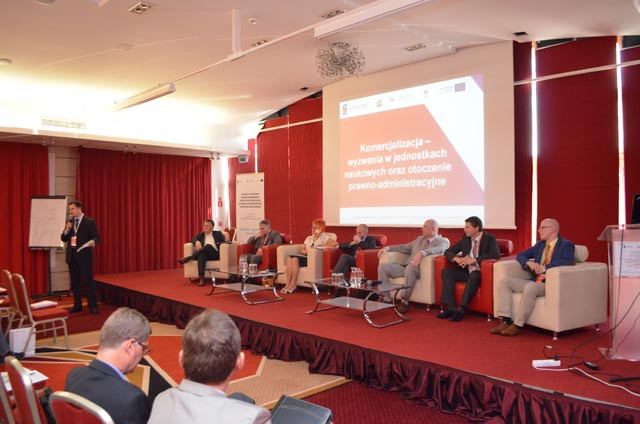The rally of the Program alumni was held on 8-10 July in Mazurkas Conference Centre & Hotel in Ożarow Mazowiecki near Warsaw. The event was attended by nearly 150 alumni and invited guests, among whom were the Minister of Science and Higher Education Prof. Barbara Kudrycka and Deputy Head of Mission at the U.S. Embassy in Poland, Mr. Douglas C. Greene.

First Day: July 8, 2013
The event was inaugurated by The Minister of Science and Higher Education Prof. Barbara Kudrycka, who mentioned several successful participants of the program and its importance for the Polish innovation. Mr. Douglas C. Green, Deputy Head of Mission at the U.S. Embassy in Poland, expressed his appreciation for the initiative and wished the new developments. The opening ceremony was also attended by Paul Marc, Director of Stanford Center for Professional Development, Prof. Piotr Moncarz of Stanford University, and Molly Nagler of the University of California, Berkeley, who thanked for a very valuable initiative Top 500 Innovators Program as well as praised the graduates and their activities. Opening ceremony was also an opportunity to meet the guests and graduates of Top 500 Innovators program with media representatives. On the 1st day also were some members of the General Assembly of the Association Top 500 Innovators, with the active participation of the Maritime University workers.
Second Day: July 9, 2013
The second day of the Rally began with Morning Motivation Session led by Grzegorz Turniak, a certified trainer and expert in the field of networking. The aim of the session was to provide graduates of the Program with practical information on effective networking and its importance in building their careers.
After that a panel dedicated to the evaluation of the Program – Experience of the Program participants was held. Contribution to the discussion was the presentation of success stories of graduates of the program - Marcin Bińkowski, PhD, the University of Silesia, and Jan Burdzieja, PhD, the Nicolaus Copernicus University in Torun, who have successfully managed to commercialize their solutions.
In the next session on Funding for research and commercialization in the 2014-2020 perspective, Prof. Jacek Guliński, Undersecretary of State in the Ministry of Science and Higher Education, presented the concept of the future financial perspective in the context of funding for research and education. The proposed changes are intended to support the development of Polish science in the direction of applied research, of course, with due regard for the basic sciences. We continue moving towards a grant system. The objective is to support the participation of Polish scientists in international research programs, including the Horizon 2020. The Minister also encouraged the rally attendants to participate in the public consultation regarding the changes in the Law on Financing of Science and Higher Education. During the discussion that accompanied the sessions, participants raised such of the need to reformulate the definition of a young scientist in the current Polish law, and to develop mechanisms to effectively support the academic enterprise.
The session Entrepreneurship in education, knowledge-based business was attended by Prof. Piotr Moncarz, Satnford University, Andrzej Kurkiewicz from the Ministry of Science and Higher Education, Prof. Stanislaw Wincenciak, Vice-Rector of Warsaw University of Technology Development, Marek Dziubiński, PhD, CEO Medicalgoritmics SA and Pawel Szydlowski of the Jagiellonian Centre of Innovation. The starting point for the discussion on academic entrepreneurship and business knowledge to analyze innovation were indicators placing Polish economy at the bottom of the European and global ranking (European Union Scorerboard Innovation, Global Innovation Index). Thus, is there any innovation, and if so, how can it be effectively implemented? Panelists discussed the key elements of the ecosystem and the effectiveness of support institutions - business incubators, technology transfer centers, seed funds, etc., the freedom of the institution and the need for entrepreneurship education. To what extend, in the Polish reality, can a university be entrepreneurial? Whether and how universities can support entrepreneurship of its employees? Do scientists get the support they really need? The need for further changes in line with the evolution not revolution, allowing university teaching load reduction for research and the need to dedicate funds in the 2014-2020 perspective to build an effective support system have been emphasized .
During the next session – Enfranchisement of scientists, the panelists - Zygmunt Grajkowski of GIZA English Ventures and Michal Zukowski of NRDC, discussed the issue concerning the ownership rights and property law of makers and college / employer.
The session dedicated to the commercialization of research results Commercialization - challenges in scientific entities and legal – administrative environment, moderated by Konrad Frontczak of the Maritime University, attended by Leszek Grabarczyk, NRDC, Cezary Rutka, President of Technox Company Limited, Lodge Lower Silesian BCC, Alicja Adamczak, PhD, President of the Patent Office, Rafał Malujda, Legal consultant, Krzysztof Gulda, Polish Defensive Holding BUMAR, Karol Lityński, President of the Center for Innovation FIRE and Marcin Binkowski, PhD, University of Silesia. Its goal was to analyze the situation of the Polish scientific institutions in the context of the commercial exploitation of scientific thought. The panelists also discussed the economic environment and institutions to support the process of technology transfer. It was noted that the previous record of commercialization in Poland is very poor, not to say disastrous. For this state of affairs a complicated legal system, mentality barriers and underdeveloped VC market are to be blamed. It was noted that the applied procedures take time to give full effect and it can only take place in a few years. For this to happen it is necessary that the different actors of technology transfer market were professionally trained to perform their functions. This also applies to administrative staff, technology transfer, as well as researchers, officials and businesses.
The first day of the Rally ended Success Stories session, during which graduates presented their program in science and business, with regard to the added value, which was the participation in the Program Top 500 Innovators.
The 1st rally of the Alumni showed how much potential lies in the community of Polish scientists and those involved in the commercialization. The result is a number of joint initiatives, start-ups, joint research projects, training, and legislative initiatives. One of the most important moments of the Rally, was the information received from the Ministry of Science and Higher Education - Prof. Barbara Kudrycka concerning the success of the PzP binds the hands of science. It is due to the commitment of the whole environment, the support of the media and the use of social networking sites that decision-makers got convinced to undertake the revision of the Law on public procurement and to raise the required thresholds to 200 thousand Euros for universities and 130 thousand Euros for research institutes.





